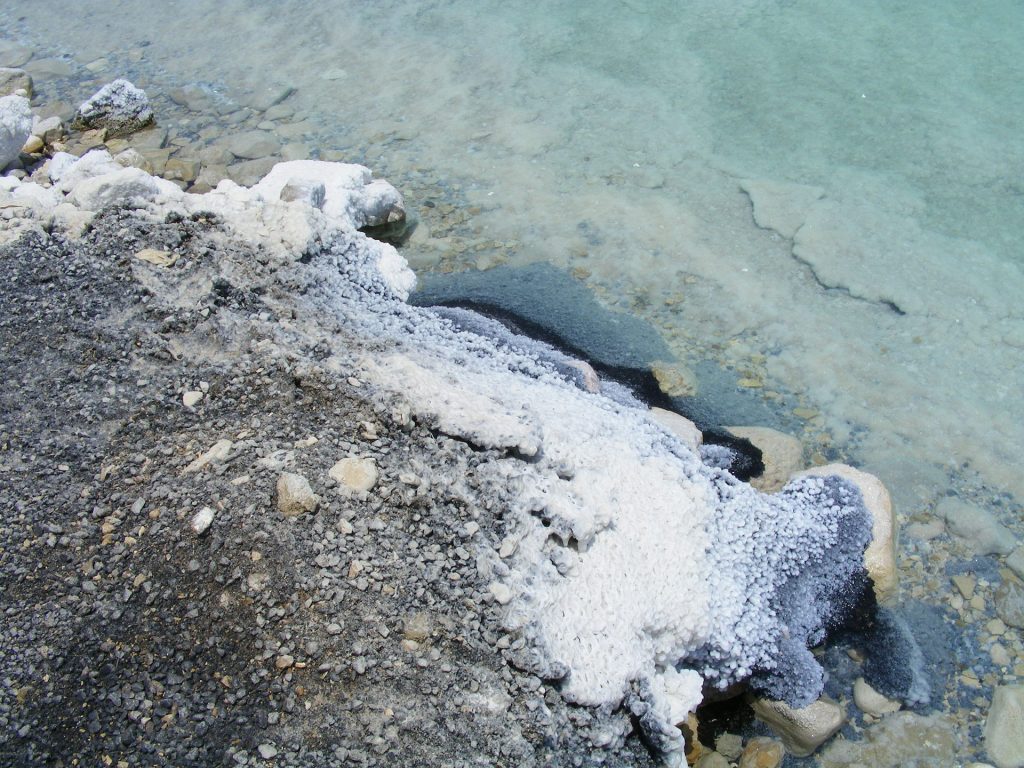In a literal sense, I have to say that I don’t think salt ever loses its saltiness and, therefore, good for nothing but being thrown down on the ground to be trodden underfoot. Salt is great for melting snow, so throwing it down on the ground helps you tread the path or drive your car without sliding off the road. Salt has many uses, and today, the biggest use is for the highways to keep them from icing up. I also like salt for softening my water.
Of course, Jesus was trying to make a point that was specific to the audience of his time. Simple stories about staying salty — wait, that does not sound right. Simple stories about living righteously, where salt is symbolic. I guess salt and saltiness (or savor) were something the people understood.
I’ve been curious before about the symbolism of salt and wrote about the covenant of salt. Anciently, people of the orient used salt to ratify agreements — it was a symbol of fidelity and constancy (New Bible Dictionary, p. 1056)
How does Salt lose its saltiness?
When Jesus was talking to his disciples, he said,
You are the salt of the earth. But if the salt loses its saltiness (savor), how can it be made salty again? It is no longer good for anything, except to be thrown out and trampled underfoot. (Matthew 5:13)
Obviously, Jesus was referring to some practice common at the time. The Hebrews had a huge supply of salt at the Dead Sea — the hill of salt at the southwest corner of the Dead Sea. This type of salt often had an outer layer of impurities or chemical changes, “generally lacking in flavor” (New Bible Dictionary, p. 1056). Therefore, the salt that Jesus was talking about would have been Dead Sea salt type — some of it was collected, and some of it was discarded as useless. Anciently, people used salt as a preservative and flavoring as well. Salt then was symbolic of something that preserved or improved taste. But they understood some of the salt collected was not good. We don’t collect salt, and therefore we don’t come in contact with impure salt collections. That’s why we may not understand the idea that salt loses its saltiness and must be thrown out.
Salt is thrown out
Another point about salt — once thrown out on the ground, it kills the vegetation. It renders the land infertile, unusable, and unproductive.
The whole land will be a burning waste of salt and sulfur–nothing planted, nothing sprouting, no vegetation growing on it. (Deut 29:23)
Perhaps, this is part of what Jesus meant in his parables when he referred to salt losing its saltiness and being good for nothing but being thrown out on the ground, causing the earth to become infertile. He didn’t want his disciples to become useless, not bringing people to the Gospel. He wants us to thrust in the sickle and harvest the grain (D&C4:4) – another common practice of years gone by, since we don’t use a sickle, but go to the store and buy flour (or bread already made for us.)
Trampled Underfoot
Jesus also talked about the tasteless salt being trampled or trodden under foot. Another interesting symbol. Isaiah has a vision in which the Lord says he has become displeased with his people — they are just checking off the boxes, attending the temple, trodding the courts of the temple as dumb animals trampling through his courts:
When you come to appear before me, who has asked this of you, this trampling of my courts Stop bringing meaningless offerings! Your incense is detestable to me. New Moons, Sabbaths and convocations— I cannot bear your worthless assemblies (Isaiah 1: 12-13)
That always reminds me of Hugh Nibley explaining the importance of having your mind clear and active when you attend the temple — “otherwise we might as well send bags of sand through the endowment while running up the most satisfying statistics on our computers.” (Nibley, Hugh, But What Kind of Work?, Approaching Zion)
Yea, so trampling is a good symbol of not devoting your heart and mind to God.
And now my beloved brethren, I say unto you, can ye withstand these sayings; yea, can ye lay aside these things, and trample the Holy One under your feet; (Alma 5:53)
References
Douglas, J.D., et al. (editors). New Bible Dictionary, Second Edition.
Nibley, Hugh. But What Kind of Work? Approaching Zion.





